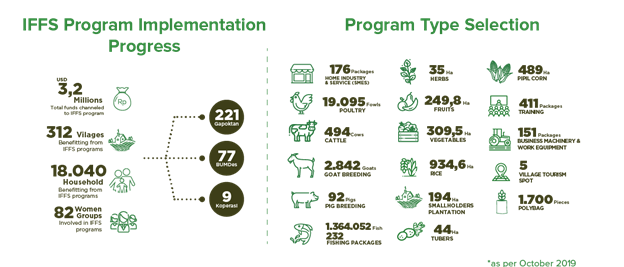If you've been following our social media and blog posts, you probably already read some stories about communities that thrive with our Desa Makmur Peduli Api (DMPA) program. But how much did you know about the program itself? How does the program actually work? Let's find out!
In short, DMPA is a program that helps improve many people's lives around our concession areas and protects the environment at the same time. It mobilizes villages and communities to take part in sustainable farming practices that contribute to their economic situation and the environment.
For example, among others, we encourage people to utilize the more sustainable and profitable sedentary farming and leave the environmentally-harmful slash-and-burn methods of clearing lands. Along the way, we also provide education, utilities, and financial support to make the transition smoother.
How did we come up with such an ambitious program? Well, it all started with our Forest Conservation Policy, which successfully resolved social conflicts and socio-economic situations in communities living near the forest. From that experience, we learned that the villagers have to be actively involved in sustainable forest management efforts while exercising economic activities that are both sustainable and responsible.
With that in mind, we embraced the customary and local communities to attain these goals. So we introduced DMPA at the end of 2015 to improve our previous community development programs. Through this newer program, we hope that villages and communities can play essential roles in sustainable forest management and achieve a shared prosperity at the same time.
We devised the program around a collaborative principle that involves active participation and coordination among all stakeholders: villagers, village administrators, partnering village institutions, NGOs, academics, and our suppliers managing local concession areas.
And to realize our FCP commitment amidst the complexity of conditions and issues unique to each village, we also design the DMPA program over these six pillars:
-
Participatory Mapping of Resources and Borders
-
Transferring Technology and Knowledge
-
Protecting and Maintaining Forest Areas
-
Resolving and Preventing Local Conflicts
-
Partnering in Product Marketing
-
Improving Forest Management and Livelihoods
These pillars are perfect for accommodating the current conditions and contexts in any target village as they are applied in progressive stages.
They are aimed to bring increased earnings and economic welfare of beneficiaries; improved food stock and food security in targeted villages; harmonized relationship between the village community and our supplier; conflicts resolutions and preventions; focused functioning or establishment of local economic institutions; as well as increased active engagement of villagers and the village administration in forest management and conservation efforts.
But how did we select the target villages?
Firstly, they have to be located inside our concession areas or within a 3 km radius outside. Secondly, the village community should have a strong connection with the forestry resources in the concession. Lastly, we see if there's any land and forest fire within the past three years around the location, as our primary objective is to prevent such incidents.
Currently, our selected villages are exclusive to five provinces in Indonesia: Riau, South Sumatra, Jambi, West Kalimantan, and East Kalimantan. But we are committed to continue improving lives across Indonesia.
In the four years since we've implemented the program, we have slowly seen the results of our efforts. The communities have also expressed their contentment joining the program and shared their success stories, like one from Lidat that we have covered in this article.

We are glad that the DMPA program has opened the village communities' minds to join our efforts of preserving the forest, creating a deep collaboration between them, regional governments, NGOs, and academics for the same purpose of ensuring a better tomorrow.
You can learn more about the DMPA program and read some other inspiring stories from the village communities in this bulletin. To get more stories like those, also make sure to keep tabs on APP Stories and follow our social media accounts on Instagram, Facebook, and Twitter. See you in the next one!
.jpg/6c9dc190-5fca-e23c-fe88-cb9ec36eb377/)
.jpg/e7e57939-196e-2c4a-eb4c-4e7d5770375c/)
